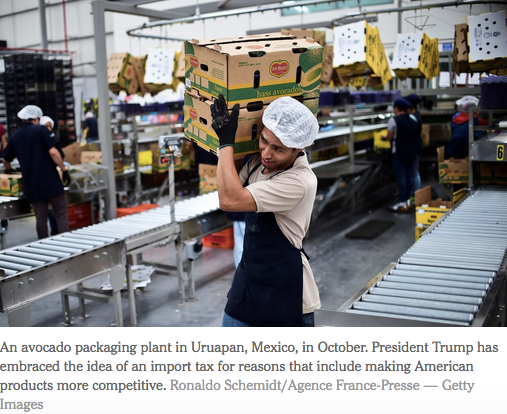GOP Divide on Border Tax
All three organizations share a common lineage: They are part of the political network overseen by Charles D. and David H. Koch, the billionaire conservative businessmen. Now they are among a host of conservative organizations mounting a furious campaign against a new tax on imports proposed by House Republicans, imperiling what is supposed to be a centerpiece of the Republican tax overhaul effort.
Their opposition threatens yet another rupture with President Trump, some of whose advisers see the provision as a critical way to bring about tax reform while protecting American manufacturers.
A profusion of strategic and political motives also divides Republicans on the issue. To enact a tax overhaul that does not increase the federal deficit but delivers rate cuts to wealthy taxpayers and corporations, Mr. Trump and Congress need to find some source of new revenue — hence the border tax. For Mr. Ryan, who holds more conventional free-trade views than Mr. Trump, the new tax provides a way to satisfy Mr. Trump’s protectionist impulses without imposing punitive, and potentially even more disruptive, tariffs.
But some conservatives are not so sure. In opposing the tax, Senator Tom Cotton, a Republican from Walmart’s home state, Arkansas, finds himself in the position of defending his local corporate giant and the conservatism that he thought he knew.
“Most conservatives I know have long believed that tax reform would look at all of the carve-outs in the tax code,” Mr. Cotton said, “not introduce a whole new concept of taxation.”
Trump Is Said to Abandon Contentious Border Tax on Imports
WASHINGTON — The Trump administration has dropped any support for a so-called border adjustment tax on imports, according to two people who have been briefed on the matter.
The tax was intended to be the keystone of a tax reform proposal developed by Republican leaders in the House of Representatives. But it faced immense pushback from influential companies including Walmart and Toyota.
If enacted, a border adjustment tax would have effectively imposed significant levies on billions of dollars of imported goods. Retailers in particular would have been hard hit, as products ranging from tires to T-shirts, which are imported from overseas, would have suddenly cost more. Automakers and other manufacturers that rely heavily on foreign parts and supplies would have also been hit.
The border tax may be revisited later, one of these people said, but it was shelved ahead of the Wednesday release of the White House’s new tax plan. A White House spokeswoman, Lindsay Walters, did not respond to requests for comment. President Trump had always seemed ambivalent toward the border tax.




